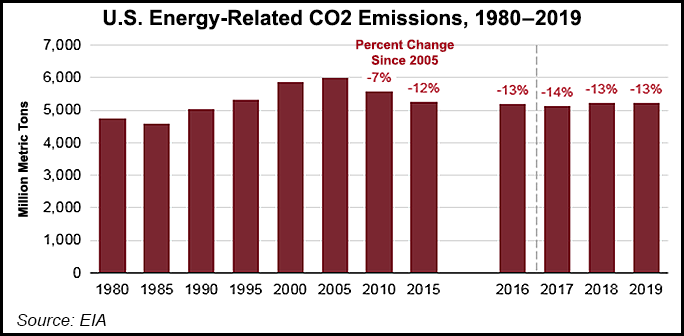Advanced Economies Increased CO2 Emissions in 2018 After Five-Year Decline, Says IEA
As world leaders gather in Poland this week to address climate change, the International Energy Agency (IEA) said the world’s advanced economies are on track to increase carbon dioxide (CO2) emissions this year, breaking a five-year run of declines, driven in part by higher oil and gas consumption.

Based on an increase in energy-related CO2 emissions from North America, the European Union and advanced economies in Asia Pacific, IEA said it expects CO2 emissions from these economies to increase by around 0.5% in 2018. The higher emissions come despite declining coal consumption, which has been offset by the increased use of oil and gas, according to the agency.
IEA timed its announcement to coincide with the 24th Session of the of the Conference of the Parties to the United Nations Framework Convention on Climate Change (COP24) being held this week in Katowice, Poland. At COP24, world leaders are expected to tackle issues related to compliance with the 2015 Paris Agreement reached at COP21.
Though the expected increase in CO2 emissions from advanced economies in 2018 is less than the 2.4% rise in economic growth, the higher emissions are “particularly worrisome for global efforts to meet the Paris Agreement,” according to IEA.
What’s more, emerging economies are also expected to grow their CO2 emissions this year, according to IEA, who plans to release its full global energy and CO2 data for 2018 in March. Though the data have not been finalized, “all indications” are that global emissions will grow year/year in 2018, driven by rising energy use and a 3.7% expansion of the global economy.
“Our data shows that despite the strong growth in solar PV and wind, emissions have started to rise again in advanced economies, highlighting the need for deploying all technologies and energy efficiency,” said IEA Executive Director Dr. Fatih Birol.
“This turnaround should be another warning to governments as they meet in Katowice this week. Increasing efforts are needed to encourage even more renewables, greater energy efficiency, more nuclear, and more innovation for technologies such as carbon capture, utilization and storage and hydrogen, for instance.”
Over the previous five years, energy-related CO2 emissions from advanced economies fell by around 3%, or close to 400 million tons, driven by a decline in coal consumption, an increase in renewables, greater energy efficiency and coal-to-gas switching, IEA said.
Global oil demand is poised to “grow robustly” this year, with global gas use also “increasing strongly” amid Chinese policies to curb air pollution in cities. Meanwhile, “large numbers of new coal power plants continue to be built and come online. The IEA expects this will lead to growth in global CO2 emissions in 2018. This growth will follow last year’s 1.6% increase, which ended a three-year period of flat emissions between 2014 and 2016.”
The IEA’s “Sustainable Development Scenario” that aligns with the goals of the Paris Agreement would see global emissions fall by more than 1% every year to 2025.
The IEA is not the only major energy organization to make a climate-related announcement coinciding with this week’s COP24 climate talks.
Royal Dutch Shell plc said Monday that it plans to link executive compensation to its long-term goal of reducing the net carbon footprint of its energy products.
The supermajor made the announcement in a joint statement developed with institutional investors on behalf of Climate Action 100+, an initiative led by investors with more than $32 trillion in assets under management.
At an industry conference in Washington, DC, in October, Shell Executive Vice President De la Rey Venter said the supermajor wants to “deliver on the aims of the Paris agreement,” referring to the United Nations accord reached in late 2015. “This is a must-win battle for our planet, not a nice-to-have. We believe it must happen, and we believe it is actually possible. That is what we want, and we are by and large united on this long-term goal.”
© 2024 Natural Gas Intelligence. All rights reserved.
ISSN © 1532-1231 | ISSN © 2577-9877 |
